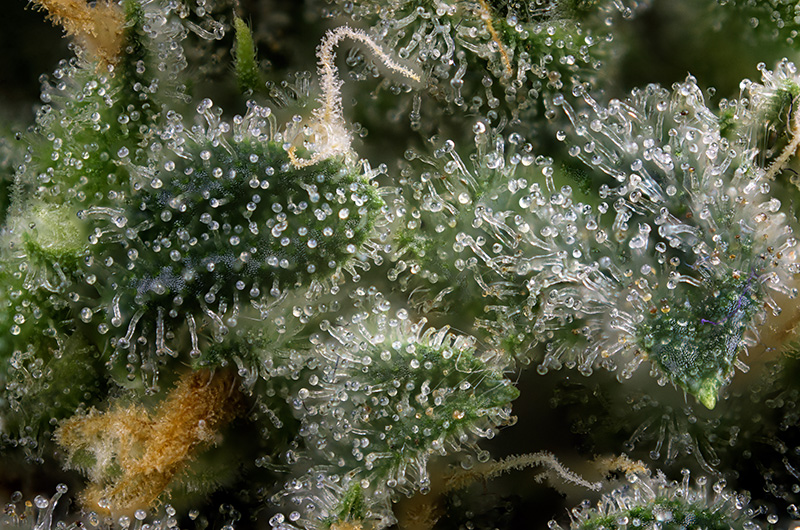Apart from the active cannabinoids found in the plant, there are additional vegetal molecules called ‘terpenes’, which are responsible for the different odors common to cannabis. They are also capable of increasing the impact of cannabis on the body. The unique smell signature of each of the cannabis strains is a result of different terpene combinations.
Terpenes add medicinal properties to those of the cannabinoids. Scientists are researching the connection between the cannabinoids and the terpenes in cannabis in order to understand their precise effects on our body and also to understand their interrelations and mutual effects. Even a small quantity of terpenes can directly impact the effects of Cannabis on the body. Terpenes contribute to the special effect of each type and strain, known as the entourage effect.
Different Terpene types and effects:
Linalool:
Linalool is a terpene commonly found in some strains of Cannabis and is known for its floral, spicy, and woody aroma. When consumed, linalool is thought to interact with the body’s endocannabinoid system, leading to various positive effects.
In terms of its effects on the human body, linalool has been shown to have potential analgesic, anti-inflammatory, and anxiolytic effects. It may also have sedative properties, making it a popular choice for those looking to alleviate symptoms of anxiety, depression, and insomnia. Some studies suggest that linalool may also have anticonvulsant, antipsychotic, and neuroprotective effects.
helps cope with acne.
Linalool is thought to promote relaxation and calmness, making it a popular choice for those looking to reduce stress and improve their overall well-being. When used in aromatherapy, linalool is believed to help relieve symptoms of anxiety, depression, and insomnia by promoting a sense of calm and relaxation.
The exact effects of linalool can vary from person to person and may be influenced by the specific strain of Cannabis consumed, the method of consumption, and the individual’s personal biochemistry
Eucalyptol:
Eucalyptol, also known as cineole, is a terpene commonly found in eucalyptus, rosemary, and some strains of Cannabis. It has a fresh, cool, and slightly sweet aroma and is known for its potential therapeutic benefits.
Eucalyptol has been shown to have potential anti-inflammatory, analgesic, and antimicrobial effects. It may also have neuroprotective properties and may be useful in treating conditions such as epilepsy and neurodegenerative diseases.
Eucalyptol is also thought to have potential benefits for respiratory health. It has been used traditionally to treat respiratory conditions such as asthma, bronchitis, and sinusitis. Some studies suggest that eucalyptol may have decongestant properties and may help to clear mucus from the airways
Trans-nerolidol:
Trans-nerolidol is known for its potential therapeutic benefits.
Trans-nerolidol have anti-inflammatory properties, which may help reduce swelling, pain, and redness in the body.
Some studies have shown that trans-nerolidol can help reduce anxiety and promote relaxation, making it a popular choice for individuals seeking a calming and stress-relieving effect.
Trans-nerolidol may help to promote sleep and relieve insomnia.
Trans-nerolidol has antimicrobial properties, meaning it may help fight off various types of bacteria, fungi, and other pathogens
Terpenol:
Terpenol is known for its potential therapeutic benefits-
Relaxation: Terpenol has a relaxing and sedative effect, which may help to reduce stress, anxiety, and insomnia.
Pain relief: Terpenol has been shown to have pain-relieving properties, which may help to reduce inflammation and alleviate pain.
induces drowsiness and increases the urge to rest; helps in sleep disorders; is found primarily in Indica strains
Geraniol:
Geraniol has a sweet, floral aroma that is often used in perfumes and fragrances. When present in high enough concentrations, it can contribute to the overall fragrance profile of a cannabis strain.
Pain relief: Geraniol has been shown to have pain-relieving properties, which may help to reduce inflammation and alleviate pain.
Anti-inflammatory properties: Geraniol has anti-inflammatory properties, which may help to reduce swelling, pain, and redness in the body.
Antioxidant effects: Geraniol has antioxidant effects, meaning it may help to protect cells from damage caused by free radicals.
Camphene:
Camphene has anti-inflammatory properties, which may help to reduce swelling, pain, and redness in the body.
Antioxidant effects: Camphene has antioxidant effects, meaning it may help to protect cells from damage caused by free radicals.
Antimicrobial properties: Camphene has antimicrobial properties, meaning it may help to fight off various types of bacteria, fungi, and other pathogens.
camphene may have positive effects on cardiovascular health, including reducing cholesterol levels and improving blood flow.
Delta-3-carene:
Delta-3-carene has been shown to have pain-relieving properties, which may help to reduce inflammation and alleviate pain.
Delta-3-carene has anti-inflammatory properties, which may help to reduce swelling, pain, and redness in the body.
Bone health: Some studies have suggested that delta-3-carene may have positive effects on bone health, including promoting the formation of new bone tissue and improving bone density.
Aroma: Delta-3-carene has a piney, earthy aroma that is often used in perfumes and fragrances. When present in high enough concentrations, it can contribute to the overall fragrance profile of a cannabis strain.
Alpha-bisabolol:
Alpha-bisabolol has been shown to have positive effects on skin health, including reducing redness and irritation, and promoting the healing of skin wounds.
Pain relief: Alpha-bisabolol has been shown to have pain-relieving properties, which may help to reduce inflammation and alleviate pain.
Myrcene:
Myrcene has been shown to have various positive effects on the body, including:
Analgesic (pain relief) properties
Anti-inflammatory properties
Antibiotic properties
Sedative effects and improved sleep quality
Increased absorption of other cannabinoids, such as THC, leading to a stronger and more efficient overall effect.
Beta-caryophyllene:
Beta-caryophyllene has a number of positive effects on the body, including:
Anti-inflammatory properties
Analgesic (pain relief) effects
Anti-anxiety and anti-depressant effects
Potential to reduce symptoms of neurodegenerative diseases
Potential to improve gut health and reduce symptoms of gastrointestinal disorders
At Impactgene, we have designed a system under which you can get the best and most accurate recommendations on how to combine all the effects of cannabis, based on your personal genetics.
To access our free cannabis dosage calculator–
Click Here!!!
References
https://www.sciencedirect.com/science/article/abs/pii/S0009279717310487
https://www.ncbi.nlm.nih.gov/pmc/articles/PMC6143706/
https://www.medicalnewstoday.com/articles/what-are-terpenes#terpenes-vs-cannabinoids
https://www.karger.com/Article/FullText/509733
https://pubmed.ncbi.nlm.nih.gov/30096653/

